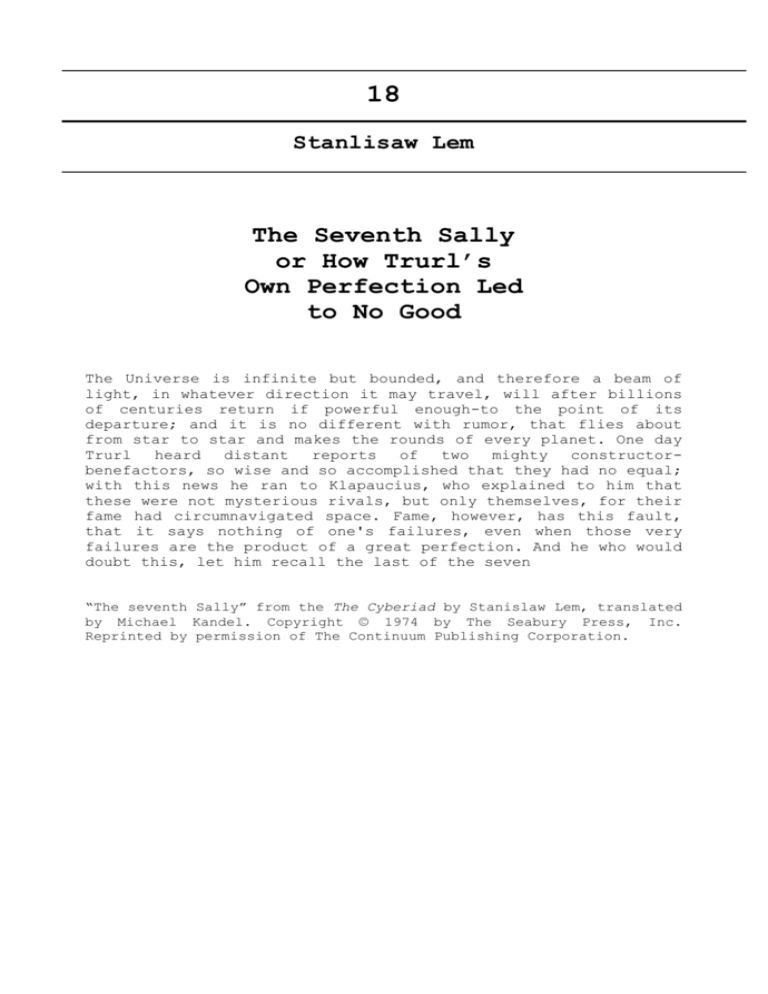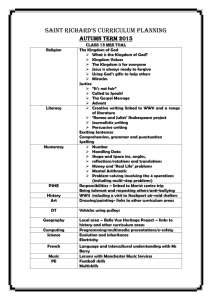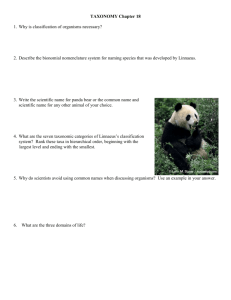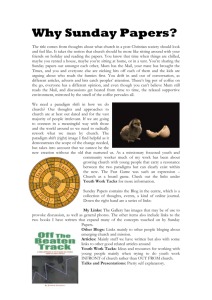
18
Stanlisaw Lem
The Seventh Sally
or How Trurl’s
Own Perfection Led
to No Good
The Universe is infinite but bounded, and therefore a beam of
light, in whatever direction it may travel, will after billions
of centuries return if powerful enough-to the point of its
departure; and it is no different with rumor, that flies about
from star to star and makes the rounds of every planet. One day
Trurl heard distant reports of two mighty constructorbenefactors, so wise and so accomplished that they had no equal;
with this news he ran to Klapaucius, who explained to him that
these were not mysterious rivals, but only themselves, for their
fame had circumnavigated space. Fame, however, has this fault,
that it says nothing of one's failures, even when those very
failures are the product of a great perfection. And he who would
doubt this, let him recall the last of the seven
“The seventh Sally” from the The Cyberiad by Stanislaw Lem, translated
by Michael Kandel. Copyright © 1974 by The Seabury Press, Inc.
Reprinted by permission of The Continuum Publishing Corporation.
The Seventh Sally
288
sallies of Trurl, which was undertaken without Klapaucius, whom
certain urgent duties kept at home at the time.
In those days Trurl was exceedingly vain, receiving all
marks of veneration and honor paid to him as his due and a
perfectly normal thing. He was heading north in his ship, as he
was the least familiar with that region, and had flown through
the void for quite some time, passing spheres full of the clamor
of war as well as spheres that had finally obtained the perfect
peace of desolation, when suddenly a little planet came into
view, really more of a stray. Fragment of matter than a planet.
On the surface of this chunk of rock someone was running
back and forth, jumping and waving his arms in the strangest
way. Astonished by a scene of such total loneliness and
concerned by those wild gestures of despair, and perhaps of
anger as well, Trurl quickly landed.
He was approached by a personage of tremendous hauteur,
iridium and vanadium all over and with a great deal of clanging
and clanking, who introduced himself as Excelsius the Tartarian,
ruler of Pancreon and Cyspenderora; the inhabitants of both
these kingdoms had, in a fit of regicidal madness, driven His
Highness from the throne and exiled him to this barren asteroid,
eternally adrift among the dark swells and currents of
gravitation.
Learning in turn the identity of his visitor, the deposed
monarch began to insist that Trurl-who after all was something
of a professional when it came to good deeds-immediately restore
him to his former position. The thought of such a turn of events
brought the flame of vengeance to the monarch's eyes, and his
iron fingers clutched the air, as if already closing around the
throats of his beloved subjects.
Now Trurl had no intention of complying with this request
of Excelsius, as doing so would bring about untold evil and
suffering, yet at the same time he wished somehow to comfort and
console the humiliated king. Thinking a moment or two, he came
to the conclusion that, even in this case, not all was lost, for
it would be possible to satisfy the king completely-without
putting his former subjects in jeopardy, And so, rolling up his
sleeves and summoning up all his mastery, Trurl built the king
an entirely new kingdom. There were plenty of towns, rivers,
mountains, forests, and brooks, a sky with clouds, armies full
of derring-do, citadels, castles, and ladies' chambers; and
there were marketplaces, gaudy and gleaming in the sun, days of
back-breaking labor, nights full of dancing and song until dawn,
and the gay clatter of swordplay. Trurl also carefully set into
this kingdom a fabulous capital, all in marble and alabaster,
and assembled a council of hoary sages, and winter palaces and
summer villas, plots, conspirators, false witnesses false
witnesses, nurses, informers, teams of magnificent
weeds, and
plumes waving crimson in the wind, and
The Seventh Sally
289
then he crisscrossed that atmosphere with silver fanfares and
twenty-one gun salutes, also threw in the necessary handful of
traitors, another of heroes, added a pinch of prophets and
seers, and one messiah and one great poet each, after which he
bent over and set the works in motion, deftly making last-minute
adjustments with his microscopic tools as it ran, and he gave
the women of that kingdom beauty, the men-sullen silence and
surliness when drunk, the officials-arrogance and servility, the
astronomers-an enthusiasm for stars, and the children-a great
capacity for noise. And all of this, connected, mounted and
ground to precision, fit into a box, and not a very large box,
but just the size that could be carried about with ease. This
Trurl presented to Excelsius, to rule and have dominion over
forever; but first he showed him where the input and output of
his brand-new kingdom were, and how to program wars, quell
rebellions, exact tribute, collect taxes, and also instructed
him in the critical points and transition states of that
microminiaturized society-in other words the maxima and minima
of palace coups and revolutions and explained everything so well
that the king, an old hand in the running of tyrannies,
instantly grasped the directions and, without hesitation, while
the constructor watched, issued a few trial proclamations,
correctly manipulating the control knobs, which were carved with
imperial eagles and regal lions. These proclamations declared a
state of emergency, martial law, a curfew, and a special levy.
After a year had passed in the kingdom, which amounted-to hardly
a minute for Trurl and the king, by an act of the greatest
magnanimity-that is, by a flick of the finger at the controlsthe king abolished one death penalty, lightened the levy, and
deigned to annul the state of emergency, whereupon a tumultuous
cry of gratitude, like the squeaking of tiny mice lifted by
their tails, rose up from the box, and through its curved glass
cover one could see, on the dusty highways and along the banks
of lazy rivers that reflected the fluffy clouds, the people
rejoicing and praising the great and unsurpassed benevolence of
their sovereign lord.
And so, though at first he had felt insulted by Trurl's
gift, in that the kingdom was too small and very like a child's
toy, the monarch saw that the thick glass lid made everything
inside seem large; perhaps too he dully understood that size was
not what mattered here, for government is not measured in meters
and kilograms, and emotions are somehow the same, whether
experienced by giants or dwarfs-and so he thanked the
constructor, if somewhat stiffly. Who knows, he might even have
liked to order him thrown in chains and tortured to death, just
to be safe-that would have been a sure way of nipping in the bud
any gossip about how some common vagabond tinkerer presented a
mighty monarch with a kingdom.
The Seventh Sally
290
Excelsius was sensible enough, however, to see that this
was out of the question, owing to a very fundamental
disproportion, for fleas could sooner take their host into
captivity than the king's army seize Trurl. So with another cold
nod, he stuck his orb and scepter under his arm, lifted the box
kingdom with a grunt, and took it to his humble but of exile.
And as blazing day alternated with murky night outside,
according to the rhythm of the asteroid's rotation, the king,
who was acknowledged by his subjects as the greatest in the
world, diligently reigned, bidding this, forbidding that,
beheading, rewarding-in all these ways incessantly spurring his
little ones on to perfect fealty and worship of the throne.
As for Trurl, he returned home and related to his friend
Klapaucius, not without pride, how he had employed his
constructor's genius to indulge the autocratic aspirations of
Excelsius and, at the same time, safeguard the democratic
aspirations of his former subjects. But Klapaucius, surprisingly
enough, had no words of praise for Trurl; in fact, there seemed
to be rebuke in his expression.
"Have I understood you correctly?" he said at last. "You
gave that brutal despot, that born slave master, that slavering
sadist of a painmonger, you gave him a whole civilization to
rule and have dominion over forever? And you tell me, moreover,
of the cries of joy brought on by the repeal of a fraction of
his cruel decrees! Trurl, how could you have done such a thing?"
"You must be joking!" Trurl exclaimed. "Really, the whole
kingdom fits into a box three feet by two by two and a half ...
it's only a model. . . .
"A model of what?"
"What do you mean, of what? Of a civilization, obviously,
except that it's a hundred million times smaller."
"And how do you know there aren't civilizations a hundred
million times larger than our own? And if there were, would ours
then be a model? And what importance do dimensions have anyway?
In that box kingdom, doesn't a journey from the capital to one
of the corners take months-for those inhabitants? And don't they
suffer, don't they know the burden of labor, don't they die?"
"Now just a minute, you know yourself that all these
processes take place only because I programmed them, and so they
aren't genuine. . . .
"Aren't genuine? You mean to say the box is empty, and the
parades, tortures, and beheadings are merely an illusion?"
"Not an illusion, no, since they have reality, though
purely as certain microscopic phenomena, which I produced by
manipulating atoms," said
The Seventh Sally
291
Trurl. "The point is, these births, loves, acts of heroism, and
denunciations are nothing but the minuscule capering of
electrons in space, precisely arranged by the skill of my
nonlinear craft, which-"
"Enough of your boasting, not another word!" Klapaucius
snapped. "Are these processes self-organizing or not?"'
"Of course they are!"
"And they occur among infinitesimal clouds of electrical
charge?"
"You know they do."
"And the phenomenological events of dawns, sunsets, and
bloody battles are generated by the concatenation of real
variables?"
"Certainly."
`And are not we as well, if you examine us physically,
mechanistically, statistically, and meticulously, nothing but
the minuscule. capering of electron clouds? Positive and
negative charges arranged in space? And is our existence not the
result of subatomic collisions and the interplay of particles,
though we ourselves perceive those molecular cartwheels as fear,
longing, or meditation? And when you daydream, what transpires
within your brain but the binary algebra of connecting and
disconnecting circuits, the continual meandering of electrons?"
"What, Klapaucius, would you equate our existence with that
of an imitation kingdom locked up in some glass box?!" cried
Trurl. "No, really, that's going too far! My purpose was simply
to fashion a simulator of statehood, a model cybernetically
perfect, nothing more!"
"Trurl! Our perfection is our curse, for it draws down upon
our every endeavor no end of unforeseeable consequences!"
Klapaucius said in a stentorian voice. "If an imperfect
imitator, wishing to inflict pain, were to build himself a crude
idol of wood or wax, and further give it some makeshift
semblance of a sentient being, his torture of the thing would be
a paltry mockery indeed! But consider a succession of
improvements on this practice! Consider the next sculptor, who
builds a doll with a recording in its belly, that it may groan
beneath his blows; consider a doll which, when beaten, begs for
mercy, no longer a crude idol, but a homeostat; consider a doll
that sheds tears, a doll that bleeds, a doll that fears death,
though it also longs for the peace that only death can bring!
Don't you see, when the imitator is perfect, so must be the
imitation, and the semblance becomes the truth, the pretense a
reality! Trurl, you took an untold number of creatures capable
of suffering and abandoned them forever to the rule of a wicked
tyrant.... Trurl, you have committed a terrible crime!"
"Sheer sophistry!" shouted Trurl, all the louder because he
felt the force of his friend's argument. "Electrons meander not
only in our
The Seventh Sally
292
brains, but in phonograph records as well, which proves nothing,
and certainly gives no grounds for such hypostatical analogies!
The subjects of that monster Excelsius do in fact die when
decapitated, sob, fight, and fall in love, since that is how I
set up the parameters, but it's impossible to say, Klapaucius,
that they feel anything in the process-the electrons jumping
around in their heads will tell you nothing of that!"
"And if I were to look inside your head, I would also see
nothing but electrons," replied Klapaucius. "Come now, don't
pretend not to understand what I'm saying, I know you're not
that stupid! A phonograph record won't run errands for you,
won't beg for mercy or fall on its knees! You say there's no way
of knowing whether Excelsius's subjects groan, when beaten,
purely because of the electrons hopping about inside-like wheels
grinding out the mimicry of a voice-or whether they really
groan, that is, because they honestly experience the pain? A
pretty distinction, this! No, Trurl, a sufferer is not one who
hands you his suffering, that you may touch it, weigh it, bite
it like a coin; a sufferer is one who behaves like a sufferer!
Prove to me here and now, once and for all, that they do not
feel, that they do not think, that they do not in any way exist
as being conscious of their enclosure between the two abysses of
oblivion-the abyss before birth and the abyss that follows
death-prove this to me, Trurl, and I'll leave you be! Prove that
you only imitated suffering, and did not create it!"
"You know perfectly well that's impossible," answered Trurl
quietly. "Even before I took my instruments in hand, when the
box was still empty, I had to anticipate the possibility of
precisely such a proof-in order to rule it out. For otherwise
the monarch of that kingdom sooner or later would have gotten
the impression that his subjects were not real subjects at all,
but puppets, marionettes. Try to understand, there was no other
way to do it! Anything that would have destroyed in the littlest
way the illusion of complete reality would have also destroyed
the importance, the dignity of governing, and turned it into
nothing but a mechanical game. . . ."
"I
understand,
I
understand
all
too
well!"
cried
Klapaucius. "Your intentions were the noblest-you only sought to
construct a kingdom as lifelike as possible, so similar to a
real kingdom, that no one, absolutely no one, could ever tell
the difference, and in this, I am afraid, you were successful!
Only hours have passed since your return, but for them, the ones
imprisoned in that box, whole centuries have gone by-how many
beings, how many lives wasted, and all to gratify and feed the
vanity of King Excelsius!"
Without another word Trurl rushed back to his ship, but saw
that his
The Seventh Sally
293
friend was coming with him. When he had blasted off into space,
pointed the bow between two great clusters of eternal flame and
opened the throttle all the way, Klapaucius said:
"Trurl, you're hopeless. You always act first, think later.
And now what do you intend to do when we get there?"
"I'll take the kingdom away from him!"
"And what will you do with it?"
"Destroy it!" Trurl was about to shout, but choked on the
first syllable when he realized what he was saying. Finally he
mumbled:
"I'll hold an election. Let them choose just rulers from
among themselves."
"You programmed them all to be feudal lords or shiftless
vassals. What good would an election do? First you'd have to
undo the entire structure of the kingdom, then assemble from
scratch . . ."
"And where," exclaimed Trurl, "does the changing of
structures end and the tampering with minds begin?!" Klapaucius
had no answer for this, and they flew on in gloomy silence, till
the planet of Excelsius came into view. As they circled it,
preparing to land, they beheld a most amazing sight.
The entire planet was covered with countless signs of
intelligent life. Microscopic bridges, like tiny lines, spanned
every rill and rivulet, while the puddles, reflecting the stars,
were full of microscopic boats like floating chips. . . . The
night side of the sphere was dotted with glimmering cities, and
on the day side one could make out flourishing metropolises,
though the inhabitants themselves were much too little to
observe, even through the strongest lens. Of the king there was
not a trace, as if the earth had swallowed him up.
"He isn't here," said Trurl in an awed whisper. "What have
they done with him? Somehow they managed to break through the
walls of their box and occupy the asteroid. . . ."
"Look!" said Klapaucius, pointing to a little cloud no
larger than a thimble and shaped like a mushroom; it slowly rose
into the atmosphere. "They've discovered atomic energy.... And
over there-you see that bit of glass? It's the remains of the
box, they've made it into some sort of temple. . . ."
"I don't understand. It was only a model, after all. A
process with a large number of parameters, a simulation, a mockup for a monarch to practice on, with the necessary feedback,
variables, multistats . . ." muttered Trurl, dumbfounded.
"Yes.
But
you
made
the
unforgivable
mistake
of
overperfecting your replica. Not wanting to build a mere
clocklike mechanism, you inad-
The Seventh Sally
294
vertently-in your punctilious way-created that which was
possible, logical, and inevitable, that which became the very
antithesis of a mechanism......
"Please, no more!" cried Trurl. And they looked out upon
the asteroid in silence, when suddenly something bumped their
ship, or rather grazed it slightly. They saw this object, for it
was illuminated by the thin ribbon of flame that issued from its
tail. A ship, probably, or perhaps an artificial satellite,
though remarkably similar to one of those steel boots the tyrant
Excelsius used to wear. And when the constructors raised their
eyes, they beheld a heavenly body shining high above the tiny
planet -- it hadn't been there previously-and they recognized,
in that cold, pale orb, the stern features of Excelsius himself,
who had in this way become the Moon of the Microminians
Reflections
But sure as oft as women weep
It is to be supposed they grieve,
-- Andrew Marvell
"No, Trurl, a sufferer is not one who hands you his suffering,
that you may touch it, weigh it, bite it like a coin; a sufferer
is one who behaves like a sufferer!"
It is interesting, the choice of words that Lem uses in
describing his fantastic simulations. Words like "digital,"
"nonlinear," "feedback," "self-organizing," and "cybernetic"
come up over and over `again in his stories. They have an oldfashioned flavor different from that of most terms that come up
in current discussions of artificial intelligence. Much of the
work in AI has wandered off in directions that have little to do
with perception, learning, and creativity. More of it is
directed toward such things as simulating the ability to use
language-and we say "simulating" advisedly. It seems to us that
many of the most difficult and challenging parts of artificial
intelligence research lie ahead-and the "self-organizing,"
"nonlinear" nature of the human mind will then come back as an
important mystery to be attacked. In the meanwhile Lem vividly
brings out some of the powerful, heady scents that those words
ought to carry.
The Seventh Sally
295
In his novel Even Cowgirls Get the Blues,* Tom Robbins has -a
passage that is strikingly similar to Lem's vision of a tiny
manufactured world:
For Christmas that year, Julian gave Sissy a miniature Tyrolean
village. The craftsmanship was remarkable.
There was a tiny cathedral whose stained-glass windows made
fruit salad of sunlight. There was a plaza and tin Biergarten. The
Biergarten got quite noisy on Saturday nights. There was a bakery that
smelled always of hot bread and strudel. There was a town hall and a
police station, with cutaway sections that revealed standard amounts
of red tape and corruption. There were little Tyroleans in leather
britches, intricately stitched, and, beneath the britches, genitalia
of_ equally fine workmanship. There were ski shops and many other
interesting things, including art orphanage. The orphanage was
designed to catch fire and burn down every Christmas Eve. Orphans
would dash into the snow with their nightgowns blazing. Terrible.
Around the second week of January, a fire inspector would come and
poke through the ruins, muttering, "If they had only listened to me,
those children would be alive today."
Although in subject it resembles the Lem piece greatly, in
flavor it is completely different. It is as if two composers had
independently come up with the same melody but harmonized it
utterly differently. Far from drawing you into believing in the
genuine feelings of the tiny people, Robbins makes you see them
as merely incredible (if not incredibly silly) pieces of fine
clockwork.
The repetition of the orphanage drama year after year,
echoing
the
Nietzschean
idea
of
eternal
recurrence-that
everything that has happened will happen again and again--seems
to rob the little world of any real meaning. Why should the
repetition of the fire inspector's lament make it sound so
hollow? Do the little Tyroleans rebuild the orphanage themselves
or is there a "RESET" button? Where do the new orphans come
from, or do the "dead" ones come back to "life"? As with the
other fantasies here, it is often instructive to think about the
details omitted.
Subtle stylistic touches and narrative tricks make all the
difference as to whether you get sucked into belief in the
genuineness of the tiny souls. Which way do you tilt?
D.R.H.
D.C.D.
*Excerpt from Even Cowgirls Get the Blues by Tom Robbins, pp. 191-192.
Copyright © 1976 by Tom Robbins. Reprinted by permission of Bantam Books.
All rights reserved








